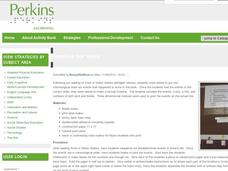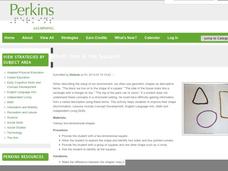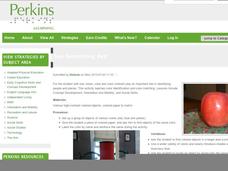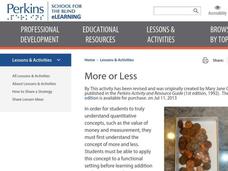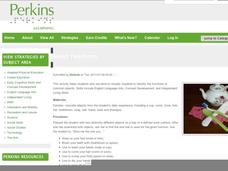Film English
Theo’s Story
Encourage your class to consider a beautiful short film about a boy named Theo who happens to be visually impaired. Over the course of the lesson, pupils work in pairs, discuss their ideas and the film as a class, view the film, take...
Perkins School for the Blind
Beginning Map Skills
Maps can be so much fun, they help you understand spatial relationships, distance between objects, and can foster direction skills. Budding cartographers with visual impairments use the Wheatley Tactile Diagramming Kit to create their...
Perkins School for the Blind
Creating a 3-D Model of a Plant Life
Instructing blind or visually impaired learners means you need to make symbolic tactile representations of various processes to provide as much input as possible. But wouldn't it be even better to have your learners make the models...
Perkins School for the Blind
Integrated Skills - Laundry
I hate doing laundry, even if it is an independent living skill that requires me to count money, follow a sequence, and sort clothing by color. Learners with multiple disabilities discuss what laundry is, why they need to do it, and how...
Perkins School for the Blind
Timeline for Anne
It is key to the learning process to make everything a child with visual impairments does as tactile as possible. After reading Anne of Green Gables, the class discusses her life events in order to make a tactile time line. They choose...
Perkins School for the Blind
Accessible Labels
When you're blind it is extremely important to be able to navigate your environment in as independent a way as possible. This idea isn't a lesson plan, but it is a great way to foster independent mobility and literacy skills while making...
Perkins School for the Blind
Tactile quilts that tell a story
Learners with multiple disabilities need to engage in projects that push them to know their full potential. They need to be able to express themselves in a variety of ways, and this very thoughtful lesson does just that. They make a...
Perkins School for the Blind
Making Choices
Here is an excellent and well-developed instructional activity intended to promote choice-making skills for learners with visual impairment and intellectual disabilities. It fosters choice-making skills through a soft version of discrete...
Perkins School for the Blind
Calendar Bingo
While this activity was designed for students with special needs, it could be used with any group learning about the calendar or days of the week. Old calendar pages become the bingo board, and numbers 1 through 31 become the numbers...
Perkins School for the Blind
Language Experience Stories
Here is a great way to bring core content to your special education classroom. Included is a set of instructional ideas intended to help learners increase their verbal and written expression through storytelling. Tape recorders, story...
Perkins School for the Blind
Where Shall I Put It?
Position and positional phrases are concepts that need to be constructed for learners with low or no vision. Help them gain competence and a conceptual understanding of words like on, in, and under with a funny game. After gathering a...
Perkins School for the Blind
3-D Task List
Staying organized is a part of growing up, and it can be as easy as making a list. Here is a set of instructions for making a three-dimensional task list especially for learners with visual impairments or blindness. After making the task...
Perkins School for the Blind
Which One is the Square?
Children who are blind need to constantly be engaged in building conceptual understandings of the world around them. This activity will help them grasp the concept of shape, identify shapes, and consider shapes as they are used to...
Perkins School for the Blind
Mix and Match
Sorting and matching are skills that have all kinds of applications. Learners with low, but useable vision work to match an object to an object, an object to a picture, and a picture to a picture. This will help them identify objects...
Perkins School for the Blind
Following Directions
Turn the act of following directions into a fun and engaging game! Especially designed for students with cognitive or intellectual disabilities, this lesson plan uses a game format as a natural reinforcer. Write a set of directions onto...
Perkins School for the Blind
Treasure Hunt
On, over, and under are some very common prepositions; but how can you teach these concepts to children with visual impairments? Here, is one way. Kids will practice following verbal commands as they go on a classroom treasure hunt. They...
Perkins School for the Blind
Student Store
Vocational training activities are extremely important for learners with intellectual or physical disabilities. Here is a great idea that will help your class become skilled at money handling, basic economic concepts, interpersonal...
Perkins School for the Blind
I See Something Red
For learners with low vision, the ability to identify colors is an important skill that will help them identify people and places. Groups of brightly colored objects are placed around the room. The child is then given a colored paper and...
Perkins School for the Blind
I'm Thinking Of...
Learning how to describe an object or a person is a great way to develop verbal and written expression. Learners with special needs improve their verbal expressive skills and concept development skills while playing a guessing game. The...
Perkins School for the Blind
Letter Confusion
Teaching a child with low or no vision how to read is the same as teaching a sighted child how to read — it all starts with letter recognition. This is a simple way to provide your learners with an opportunity to practice reading and...
Perkins School for the Blind
More or Less
The concept of more or less is one that needs to be mastered prior to learning other concepts such as quantitative analysis, addition, or subtraction. This activity provides several ways to teach learners with low or no vision to...
Perkins School for the Blind
Object Functions
What does that thing do? For learners with low or no vision, understanding an object's function is a necessary skill. Here learners handle a number of objects and are asked to determine which object is for a specific task. They can feel...
Perkins School for the Blind
A Visit to the Doctor
Going to the doctor's office may be a source of stress and uncertainty for some children. Help your learners with special needs discover what to expect at and how to cope with their next trip to the doctor. They explore real medical...
Perkins School for the Blind
What Would You Do If...?
What would you do if...? That's a great question, and, when posed to learners with visual impairments, a question that can foster concept development and speaking and problem-solving skills that relate to real-life situations. The...






